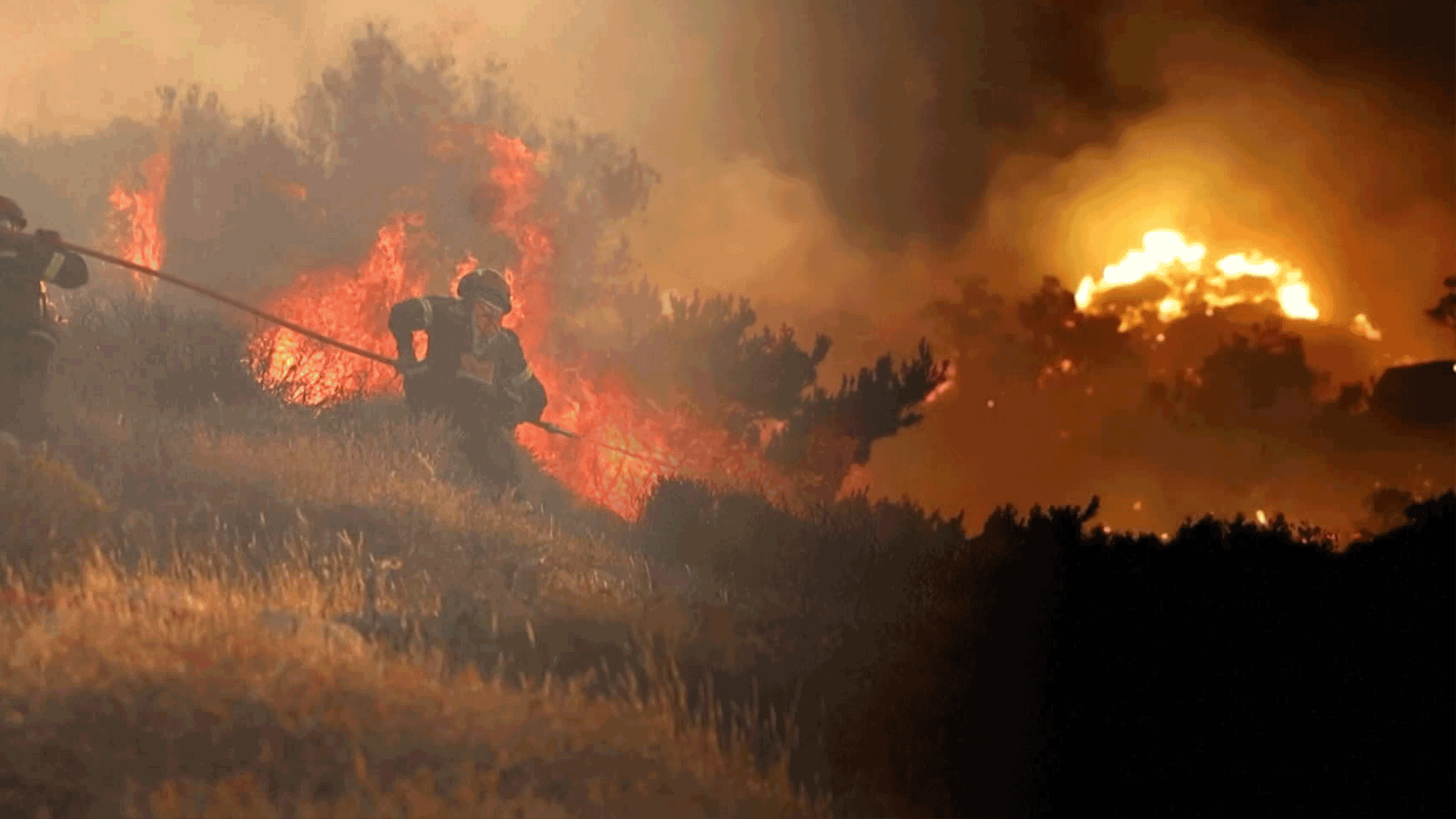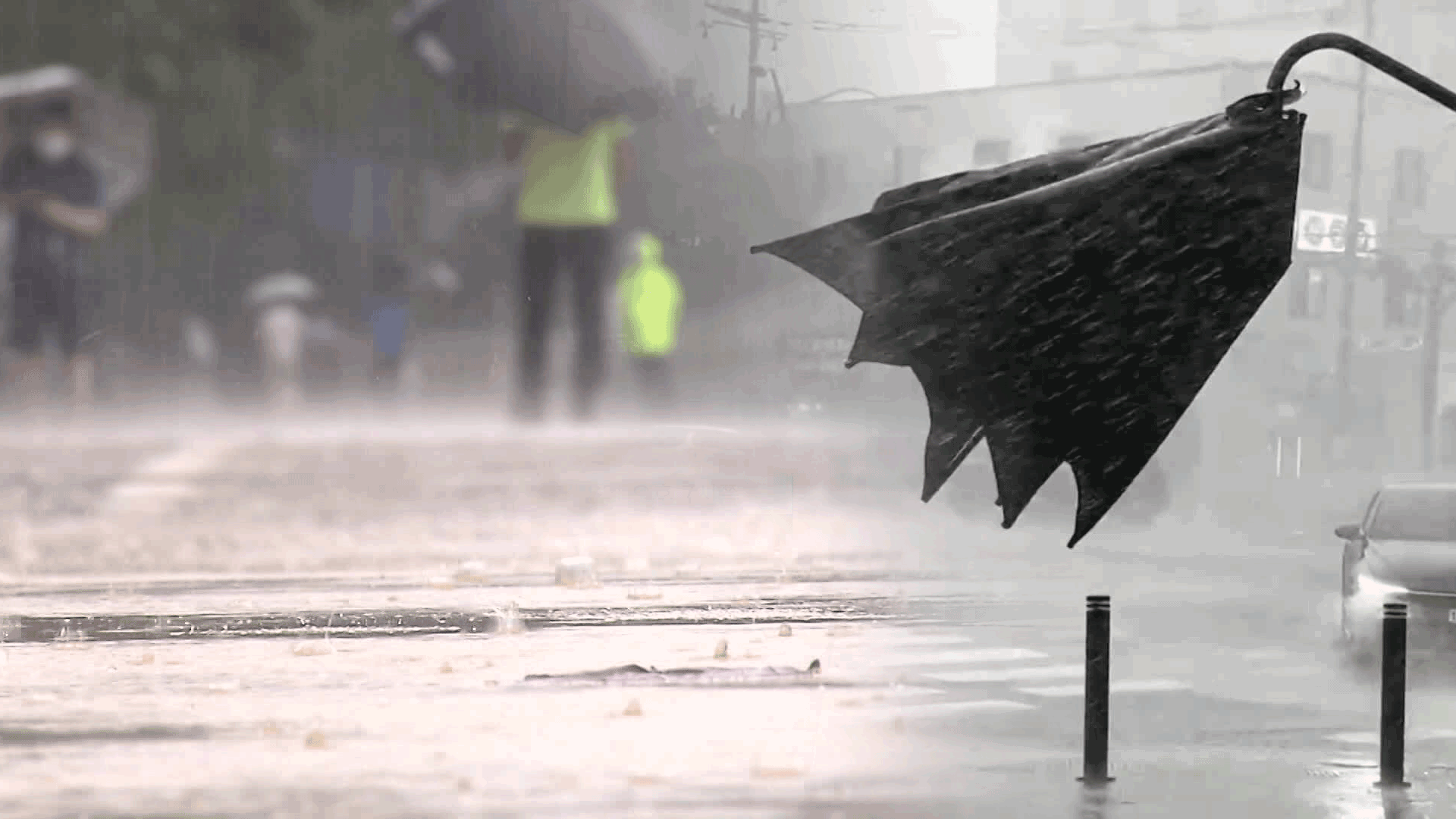[Anchor]
Europe is also suffering from extreme heat.
As wildfires spread, the sea temperature in the Mediterranean has risen by more than 5 degrees Celsius compared to normal.
In contrast, Russia is experiencing its coldest summer in 63 years.
This is a report by our correspondent Lee Hwa-jin.
[Report]
Flames spreading across the fields, helicopters are attempting to extinguish the fire, but it is not enough.
On July 3rd local time, a wildfire that started a day earlier on the famous Greek vacation island of Crete spread to residential areas due to hot, dry winds.
A large wildfire also broke out near Athens, forcing residents to evacuate the village.
[Manolis Frangoulis/Mayor of Ierapetra, Greece: "Thousands of flames erupted across the entire village, and unfortunately, due to the very strong winds, the fire trucks were unable to carry out their operations."]
The heat dome that started in Africa is raising temperatures to 40 degrees in the Balkans and Germany, passing through Spain and France.
With severe drought compounding the situation, water levels in rivers and lakes have dropped, and residents are facing crop damage and restrictions on drinking water.
[Helena Arapovic/Resident of Montenegro: "This heatwave, the hot air, the wind, everything is unbearable. It hits 40 degrees every day, and it seems like this will continue for 25 days straight."]
The Mediterranean Sea is also getting hotter.
The eastern sea of Spain recorded a temperature of 30.99 degrees, which is more than 5 degrees higher than the average.
Research shows that the sea temperature in the Mediterranean rises by 0.4 degrees every decade, raising concerns about ecological changes.
In contrast, Moscow, Russia, which experienced a once-in-a-century heatwave at this time last year, is starting its coolest summer in 63 years this year.
This is Lee Hwa-jin reporting from Paris for KBS News.
Europe is also suffering from extreme heat.
As wildfires spread, the sea temperature in the Mediterranean has risen by more than 5 degrees Celsius compared to normal.
In contrast, Russia is experiencing its coldest summer in 63 years.
This is a report by our correspondent Lee Hwa-jin.
[Report]
Flames spreading across the fields, helicopters are attempting to extinguish the fire, but it is not enough.
On July 3rd local time, a wildfire that started a day earlier on the famous Greek vacation island of Crete spread to residential areas due to hot, dry winds.
A large wildfire also broke out near Athens, forcing residents to evacuate the village.
[Manolis Frangoulis/Mayor of Ierapetra, Greece: "Thousands of flames erupted across the entire village, and unfortunately, due to the very strong winds, the fire trucks were unable to carry out their operations."]
The heat dome that started in Africa is raising temperatures to 40 degrees in the Balkans and Germany, passing through Spain and France.
With severe drought compounding the situation, water levels in rivers and lakes have dropped, and residents are facing crop damage and restrictions on drinking water.
[Helena Arapovic/Resident of Montenegro: "This heatwave, the hot air, the wind, everything is unbearable. It hits 40 degrees every day, and it seems like this will continue for 25 days straight."]
The Mediterranean Sea is also getting hotter.
The eastern sea of Spain recorded a temperature of 30.99 degrees, which is more than 5 degrees higher than the average.
Research shows that the sea temperature in the Mediterranean rises by 0.4 degrees every decade, raising concerns about ecological changes.
In contrast, Moscow, Russia, which experienced a once-in-a-century heatwave at this time last year, is starting its coolest summer in 63 years this year.
This is Lee Hwa-jin reporting from Paris for KBS News.
■ 제보하기
▷ 카카오톡 : 'KBS제보' 검색, 채널 추가
▷ 전화 : 02-781-1234, 4444
▷ 이메일 : kbs1234@kbs.co.kr
▷ 유튜브, 네이버, 카카오에서도 KBS뉴스를 구독해주세요!
- Mediterranean boils, Russia cools
-
- 입력 2025-07-04 23:59:27

[Anchor]
Europe is also suffering from extreme heat.
As wildfires spread, the sea temperature in the Mediterranean has risen by more than 5 degrees Celsius compared to normal.
In contrast, Russia is experiencing its coldest summer in 63 years.
This is a report by our correspondent Lee Hwa-jin.
[Report]
Flames spreading across the fields, helicopters are attempting to extinguish the fire, but it is not enough.
On July 3rd local time, a wildfire that started a day earlier on the famous Greek vacation island of Crete spread to residential areas due to hot, dry winds.
A large wildfire also broke out near Athens, forcing residents to evacuate the village.
[Manolis Frangoulis/Mayor of Ierapetra, Greece: "Thousands of flames erupted across the entire village, and unfortunately, due to the very strong winds, the fire trucks were unable to carry out their operations."]
The heat dome that started in Africa is raising temperatures to 40 degrees in the Balkans and Germany, passing through Spain and France.
With severe drought compounding the situation, water levels in rivers and lakes have dropped, and residents are facing crop damage and restrictions on drinking water.
[Helena Arapovic/Resident of Montenegro: "This heatwave, the hot air, the wind, everything is unbearable. It hits 40 degrees every day, and it seems like this will continue for 25 days straight."]
The Mediterranean Sea is also getting hotter.
The eastern sea of Spain recorded a temperature of 30.99 degrees, which is more than 5 degrees higher than the average.
Research shows that the sea temperature in the Mediterranean rises by 0.4 degrees every decade, raising concerns about ecological changes.
In contrast, Moscow, Russia, which experienced a once-in-a-century heatwave at this time last year, is starting its coolest summer in 63 years this year.
This is Lee Hwa-jin reporting from Paris for KBS News.
Europe is also suffering from extreme heat.
As wildfires spread, the sea temperature in the Mediterranean has risen by more than 5 degrees Celsius compared to normal.
In contrast, Russia is experiencing its coldest summer in 63 years.
This is a report by our correspondent Lee Hwa-jin.
[Report]
Flames spreading across the fields, helicopters are attempting to extinguish the fire, but it is not enough.
On July 3rd local time, a wildfire that started a day earlier on the famous Greek vacation island of Crete spread to residential areas due to hot, dry winds.
A large wildfire also broke out near Athens, forcing residents to evacuate the village.
[Manolis Frangoulis/Mayor of Ierapetra, Greece: "Thousands of flames erupted across the entire village, and unfortunately, due to the very strong winds, the fire trucks were unable to carry out their operations."]
The heat dome that started in Africa is raising temperatures to 40 degrees in the Balkans and Germany, passing through Spain and France.
With severe drought compounding the situation, water levels in rivers and lakes have dropped, and residents are facing crop damage and restrictions on drinking water.
[Helena Arapovic/Resident of Montenegro: "This heatwave, the hot air, the wind, everything is unbearable. It hits 40 degrees every day, and it seems like this will continue for 25 days straight."]
The Mediterranean Sea is also getting hotter.
The eastern sea of Spain recorded a temperature of 30.99 degrees, which is more than 5 degrees higher than the average.
Research shows that the sea temperature in the Mediterranean rises by 0.4 degrees every decade, raising concerns about ecological changes.
In contrast, Moscow, Russia, which experienced a once-in-a-century heatwave at this time last year, is starting its coolest summer in 63 years this year.
This is Lee Hwa-jin reporting from Paris for KBS News.
-
-

이화진 기자 hosky@kbs.co.kr
이화진 기자의 기사 모음
-
이 기사가 좋으셨다면
-
좋아요
0
-
응원해요
0
-
후속 원해요
0















이 기사에 대한 의견을 남겨주세요.